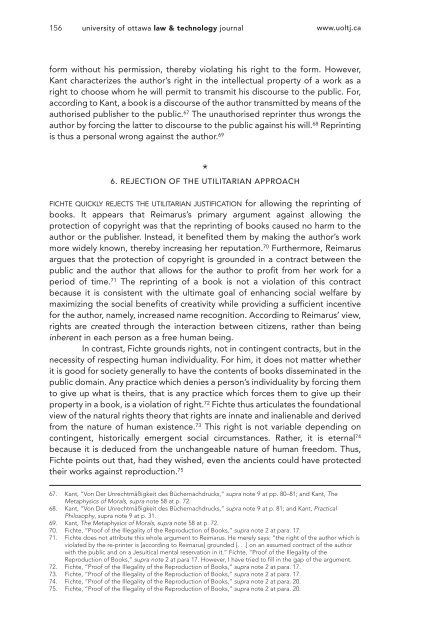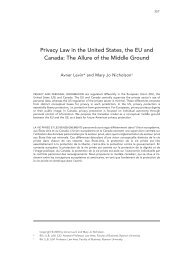Commentary on Fichte's “The Illegality of the Unauthorised ... - uoltj
Commentary on Fichte's “The Illegality of the Unauthorised ... - uoltj
Commentary on Fichte's “The Illegality of the Unauthorised ... - uoltj
You also want an ePaper? Increase the reach of your titles
YUMPU automatically turns print PDFs into web optimized ePapers that Google loves.
156 university <strong>of</strong> ottawa law & technology journal www.<strong>uoltj</strong>.ca<br />
form without his permissi<strong>on</strong>, <strong>the</strong>reby violating his right to <strong>the</strong> form. However,<br />
Kant characterizes <strong>the</strong> author’s right in <strong>the</strong> intellectual property <strong>of</strong> a work as a<br />
right to choose whom he will permit to transmit his discourse to <strong>the</strong> public. For,<br />
according to Kant, a book is a discourse <strong>of</strong> <strong>the</strong> author transmitted by means <strong>of</strong> <strong>the</strong><br />
authorised publisher to <strong>the</strong> public. 67 The unauthorised reprinter thus wr<strong>on</strong>gs <strong>the</strong><br />
author by forcing <strong>the</strong> latter to discourse to <strong>the</strong> public against his will. 68 Reprinting<br />
is thus a pers<strong>on</strong>al wr<strong>on</strong>g against <strong>the</strong> author. 69<br />
*<br />
6. REJECTION OF THE UTILITARIAN APPROACH<br />
Fichte quickly rejects <strong>the</strong> utilitarian justificati<strong>on</strong> for allowing <strong>the</strong> reprinting <strong>of</strong><br />
books. It appears that Reimarus’s primary argument against allowing <strong>the</strong><br />
protecti<strong>on</strong> <strong>of</strong> copyright was that <strong>the</strong> reprinting <strong>of</strong> books caused no harm to <strong>the</strong><br />
author or <strong>the</strong> publisher. Instead, it benefited <strong>the</strong>m by making <strong>the</strong> author’s work<br />
more widely known, <strong>the</strong>reby increasing her reputati<strong>on</strong>. 70 Fur<strong>the</strong>rmore, Reimarus<br />
argues that <strong>the</strong> protecti<strong>on</strong> <strong>of</strong> copyright is grounded in a c<strong>on</strong>tract between <strong>the</strong><br />
public and <strong>the</strong> author that allows for <strong>the</strong> author to pr<strong>of</strong>it from her work for a<br />
period <strong>of</strong> time. 71 The reprinting <strong>of</strong> a book is not a violati<strong>on</strong> <strong>of</strong> this c<strong>on</strong>tract<br />
because it is c<strong>on</strong>sistent with <strong>the</strong> ultimate goal <strong>of</strong> enhancing social welfare by<br />
maximizing <strong>the</strong> social benefits <strong>of</strong> creativity while providing a sufficient incentive<br />
for <strong>the</strong> author, namely, increased name recogniti<strong>on</strong>. According to Reimarus’ view,<br />
rights are created through <strong>the</strong> interacti<strong>on</strong> between citizens, ra<strong>the</strong>r than being<br />
inherent in each pers<strong>on</strong> as a free human being.<br />
In c<strong>on</strong>trast, Fichte grounds rights, not in c<strong>on</strong>tingent c<strong>on</strong>tracts, but in <strong>the</strong><br />
necessity <strong>of</strong> respecting human individuality. For him, it does not matter whe<strong>the</strong>r<br />
it is good for society generally to have <strong>the</strong> c<strong>on</strong>tents <strong>of</strong> books disseminated in <strong>the</strong><br />
public domain. Any practice which denies a pers<strong>on</strong>’s individuality by forcing <strong>the</strong>m<br />
to give up what is <strong>the</strong>irs, that is any practice which forces <strong>the</strong>m to give up <strong>the</strong>ir<br />
property in a book, is a violati<strong>on</strong> <strong>of</strong> right. 72 Fichte thus articulates <strong>the</strong> foundati<strong>on</strong>al<br />
view <strong>of</strong> <strong>the</strong> natural rights <strong>the</strong>ory that rights are innate and inalienable and derived<br />
from <strong>the</strong> nature <strong>of</strong> human existence. 73 This right is not variable depending <strong>on</strong><br />
c<strong>on</strong>tingent, historically emergent social circumstances. Ra<strong>the</strong>r, it is eternal 74<br />
because it is deduced from <strong>the</strong> unchangeable nature <strong>of</strong> human freedom. Thus,<br />
Fichte points out that, had <strong>the</strong>y wished, even <strong>the</strong> ancients could have protected<br />
<strong>the</strong>ir works against reproducti<strong>on</strong>. 75<br />
67. Kant, “V<strong>on</strong> Der Unrechtmäßigkeit des Büchernachdrucks,” supra note 9 at pp. 80–81; and Kant, The<br />
Metaphysics <strong>of</strong> Morals, supra note 58 at p. 72.<br />
68. Kant, “V<strong>on</strong> Der Unrechtmäßigkeit des Büchernachdrucks,” supra note 9 at p. 81; and Kant, Practical<br />
Philosophy, supra note 9 at p. 31.<br />
69. Kant, The Metaphysics <strong>of</strong> Morals, supra note 58 at p. 72.<br />
70. Fichte, “Pro<strong>of</strong> <strong>of</strong> <strong>the</strong> <strong>Illegality</strong> <strong>of</strong> <strong>the</strong> Reproducti<strong>on</strong> <strong>of</strong> Books,” supra note 2 at para. 17.<br />
71. Fichte does not attribute this whole argument to Reimarus. He merely says: “<strong>the</strong> right <strong>of</strong> <strong>the</strong> author which is<br />
violated by <strong>the</strong> re-printer is [according to Reimarus] grounded [. . .] <strong>on</strong> an assumed c<strong>on</strong>tract <strong>of</strong> <strong>the</strong> author<br />
with <strong>the</strong> public and <strong>on</strong> a Jesuitical mental reservati<strong>on</strong> in it.” Fichte, “Pro<strong>of</strong> <strong>of</strong> <strong>the</strong> <strong>Illegality</strong> <strong>of</strong> <strong>the</strong><br />
Reproducti<strong>on</strong> <strong>of</strong> Books,” supra note 2 at para 17. However, I have tried to fill in <strong>the</strong> gap <strong>of</strong> <strong>the</strong> argument.<br />
72. Fichte, “Pro<strong>of</strong> <strong>of</strong> <strong>the</strong> <strong>Illegality</strong> <strong>of</strong> <strong>the</strong> Reproducti<strong>on</strong> <strong>of</strong> Books,” supra note 2 at para. 17.<br />
73. Fichte, “Pro<strong>of</strong> <strong>of</strong> <strong>the</strong> <strong>Illegality</strong> <strong>of</strong> <strong>the</strong> Reproducti<strong>on</strong> <strong>of</strong> Books,” supra note 2 at para. 17.<br />
74. Fichte, “Pro<strong>of</strong> <strong>of</strong> <strong>the</strong> <strong>Illegality</strong> <strong>of</strong> <strong>the</strong> Reproducti<strong>on</strong> <strong>of</strong> Books,” supra note 2 at para. 20.<br />
75. Fichte, “Pro<strong>of</strong> <strong>of</strong> <strong>the</strong> <strong>Illegality</strong> <strong>of</strong> <strong>the</strong> Reproducti<strong>on</strong> <strong>of</strong> Books,” supra note 2 at para. 20.









